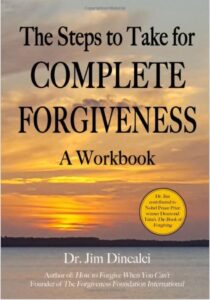
- Imagine having more Love, Joy, and Peace of Mind!
- Be free of your resentments, hostility, and grudges for good.
Nobel Peace Prize winner Archbishop Desmond Tutu and his daughter Mpho acknowledged Dr. Jim for contributing to their book, The Book of Forgiving, and Jim’s spending “over twenty-five years counseling and teaching people who are struggling to forgive.”
____________________________
The viewpoints and exercises in this book will help you:
- Get rid of past upsets.
- Forgive yourself and others.
- Reduce stress and be much happier.
- Deal with the most awful things done to you.
- Make positive and permanent changes in your life.
- Learn what abuse and trauma survivors need to know.
- Deal with the many emotional blocks that prevent forgiving.
- Discover which of the over 40 powerful forgiveness techniques is best for you.
This book gives you the secrets and essentials to forgive more easily.
What it says
- Forgiveness is for you, not for your offender. It allows you to live in freedom and joy, regardless of what has gone before.
- You might be right, they do not deserve forgiveness. BUT, you forgive for yourself, for your benefit, and your peace of mind.
- The purpose of forgiving is for letting go of the negative emotions and thoughts that produce depression, resentment, and anger.
- At some level, harboring any resentment, large or small, affects your life and interactions with people.
- Gaining self-forgiveness is vital to your emotional happiness, spiritual connection, and physical health.. The book answers why we sabotage ourselves and how to deal with it.
- Forgiveness does not demand reconciliation. Reconciliation requires the deep work of rebuilding trust. Forgiveness is an excellent first step.
- Forgiveness is not a pardoning of bad behavior or the justification of an offense. You can forgive and set limits on bad behavior.
- You can forgive and choose to never see the other person again to protect against abusive behavior.
- You may wait forever for an apology because the person may have a different perspective.
- Forgive and forget is a myth. The brain is not set up to forget. Real forgiveness allows the upset to fade in the mind because it is no longer activated. Trying to forget about a hurt is not forgiveness but denial. The negative results of denial influence you in a gradual, subtle way, but with harmful effects under the surface of your mind, causing trouble for you when you aren’t even aware of it.
____________________________
Dr. Jim Dincalci brings 50 years of work in traditional and alternative healing therapies, religion, and counseling. Since 1993, when he had a personal forgiveness transformation, he has taught forgiveness work at international conferences, and in hospitals, schools, churches, counseling agencies, and semester courses at several universities. He is the founder and director of The Forgiveness Foundation International, since 2001. His book, How to Forgive When You Can’t: The Breakthrough Guide to Free Your Heart and Mind, is published in nine languages, has four national awards, and sold 100,000 copies worldwide.
His work has been used successfully worldwide to heal and renew lives.
____________________________
“Aggression, rage, depression and most other woes that plague us have, as their source, errors from the past which have never been forgiven. This book offers individuals time-saving ways of defusing the past.”
– Retired Professor of Psychology, Michael Berkes, PhD, MBA
